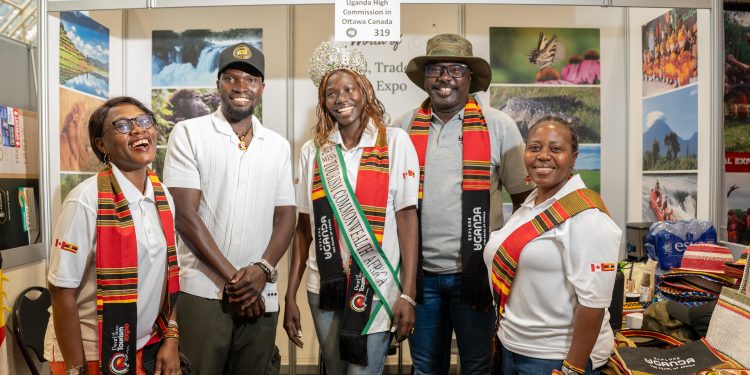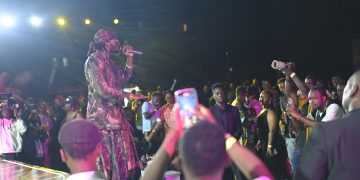Uganda concluded its participation at the World Travel, Trade and Taste 2025 Expo with a deliberate and calculated display of economic and cultural intent, using one of its strongest export commodities (coffee) as both a product and a message.
At the center of the showcase was H.E. Ambassador Allan Kajik, Uganda’s High Commissioner to Canada, who personally served brewed Ugandan coffee and distributed roasted beans to thousands of attendees.
The act, while simple in form, was a strategic representation of Uganda’s effort to move beyond raw commodity exports and claim a stronger position in the global value chain.
Branded “Golden Brew,” the coffee served was more than a beverage. It was Uganda’s entry point to a deeper discussion around identity, trade equity, and value-added exports.
Ambassador Kajik reinforced this message by distributing “Visit Uganda” wristbands small tokens carrying a much larger signal: that Uganda is ready to host, trade, and partner on new terms.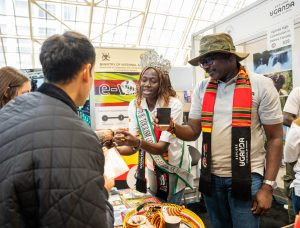 “Every bean has a story,” the Ambassador said. “We don’t just export coffee, we export identity, resilience, and partnership.”
“Every bean has a story,” the Ambassador said. “We don’t just export coffee, we export identity, resilience, and partnership.”
Uganda is the second-largest coffee exporter in Africa and ranks eighth globally, contributing over 5 million 60-kg bags annually.
The sector represents more than 20% of Uganda’s foreign exchange earnings and supports approximately 1.8 million households.
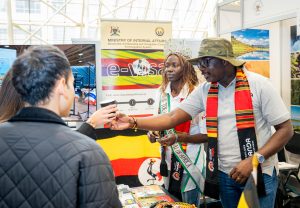
But the emphasis at the expo was not on numbers. Instead, Uganda positioned itself as a country transitioning from a supplier of raw goods to a participant in higher-margin, branded, and origin-aware trade.
Uganda is among the few countries that grow both Arabica and Robusta coffee naturally, with Robusta being indigenous to the country’s highland forests.
The specialty Arabica beans from regions like Mount Elgon and Sipi Falls have already attracted recognition in premium markets for their distinctive acidity and flavor.
By turning the final showcase into a direct, hands-on interaction with a core export, Uganda’s representatives used coffee as a platform for diplomacy.
This approach aligns with the country’s broader trade strategy focused on: Increasing value addition at the source, engaging its diaspora to lead market linkages abroad and Strengthening cooperative structures and branding mechanisms for smallholder farmers
Trade delegates and importers at the event responded with interest. A coffee importer from Vancouver noted that the story and traceability of the product made it more appealing than conventional commercial blends. A delegate from Montreal expressed readiness to pursue new trade opportunities with Ugandan cooperatives.
While the coffee demonstration was central, the real takeaway was Uganda’s attempt to reshape how it is seen globally not just as an exporter, but as a negotiator of its own economic identity. This includes tourism, culture, and digital innovation, all of which were integrated into the broader message shared at the event.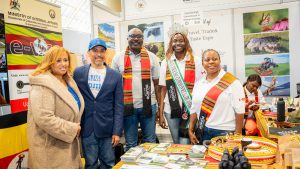 The Ugandan High Commission in Canada, under Ambassador Kajik’s leadership, is advancing a model of diplomacy that centers on tangible trade engagement and diaspora-led influence, particularly across North America.
The Ugandan High Commission in Canada, under Ambassador Kajik’s leadership, is advancing a model of diplomacy that centers on tangible trade engagement and diaspora-led influence, particularly across North America.
Uganda used the platform not for ceremony, but for positioning. The message delivered in Toronto was specific: Uganda is not asking for attention it is offering terms. Terms that reflect its growing capacity, its export potential, and its readiness for equitable, sustainable trade relationships.
“You don’t need to shout to be remembered,” one attendee remarked, holding their branded wristband.
“You need a clear identity—and something of value to offer.”
Uganda’s value proposition is no longer buried in bulk commodities. It is found in the quality of its exports, the structure of its trade, and the clarity of its narrative.


